#AWS Cloudformation
Explore tagged Tumblr posts
Text
Infrastructure as Code (IaC) in DevOps: The Key to Streamlined DevOps Infrastructure Management
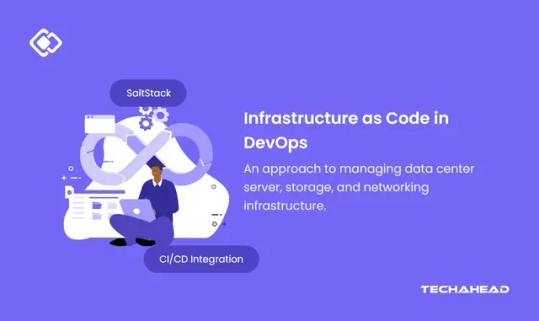
DevOps has undoubtedly been one of the most transformative trends in the development industry in recent years. Currently, there are thousands of DevOps job openings listed in the US. 74% of companies, including giants like Amazon, Facebook, Netflix, Walmart, and NASA, have already embraced DevOps practices.
The global Infrastructure as Code (IaC) market was valued at $0.8 billion in 2022 and is expected to surge to $2.3 billion by 2027, experiencing a compound annual growth rate (CAGR) of 24% during this period.
A core principle of DevOps is maximizing automation, which naturally extends to infrastructure management. Embracing Infrastructure as Code in DevOps is essential to fully align with the DevOps methodology.
Infrastructure as Code (IaC) is a software engineering practice that enables the management and provisioning of infrastructure resources through code. This involves writing code to define and configure components like virtual machines, networks, storage, and other resources required for systems or applications.
With IaC, teams no longer manually set up infrastructure through graphical interfaces or command-line inputs. Instead, they write configurations in code, using declarative languages or configuration files. They can version, review, and test this code like any other software.
This approach marks a major shift in IT infrastructure management. Traditionally, configuring servers, networks, and storage was time-intensive and prone to errors. However, Infrastructure as Code in DevOps has streamlined this process, reducing manual effort and enhancing consistency.
Let’s delve deeper into understanding IaC and its benefits to streamline DevOps infrastructure management.
Key Takeaways:
Infrastructure as Code enables the management of IT infrastructure through code, enhancing automation and consistency
IaC eliminates manual configuration, reducing errors and enabling faster environment provisioning
Integrating IaC into CI/CD pipelines ensures infrastructure evolves alongside application code for faster, more reliable deployments
IaC boosts reliability, scalability, disaster recovery, and cost efficiency, making it indispensable for modern DevOps practices
What is Infrastructure as Code?
Infrastructure as Code (IaC) refers to the practice of managing and provisioning IT infrastructure through code. Traditionally, configuring servers, storage, or networks was manual, time-consuming, and prone to errors. With the Infrastructure as Code approach, teams automate these processes, reducing risks and boosting efficiency.
IaC allows developers and IT teams to write code that manages infrastructure just as they would manage software. This means teams version-control, test, and continuously improve the infrastructure just like any application. They create stable environments that are easy to deploy, ensuring consistency and repeatability.
How Does Infrastructure as Code Work in DevOps?
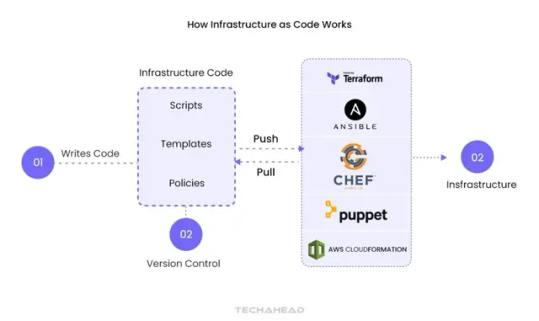
In a DevOps or DevSecOps environment, the Infrastructure as Code approach is key to automating and managing infrastructure with precision. By treating infrastructure as code, organizations can achieve higher efficiency, scalability, and security across their IT operations. Let’s dive deeper into each of the stages:
Infrastructure Definition
Here, teams write all components of the infrastructure, such as virtual machines, databases, and network settings, as code. Instead of manual configuration, teams use high-level languages like YAML, JSON, or HCL to describe these elements. This allows developers to define the exact infrastructure requirements consistently. A well-defined infrastructure through code means that environments can be replicated across development, testing, and production without discrepancies, ensuring consistency and reducing the likelihood of errors.
Versioning
One of the biggest advantages of the Infrastructure as Code is the ability to version control the infrastructure. Using platforms like Git, teams can store their infrastructure code in repositories. This brings traceability, as every change is tracked, and you can see who made it, when, and why. Versioning also empowers teams to roll back to previous configurations if something goes wrong during updates or deployments. This ensures stability and gives teams the confidence to make frequent changes without fear of breaking infrastructure.
Automated Provisioning
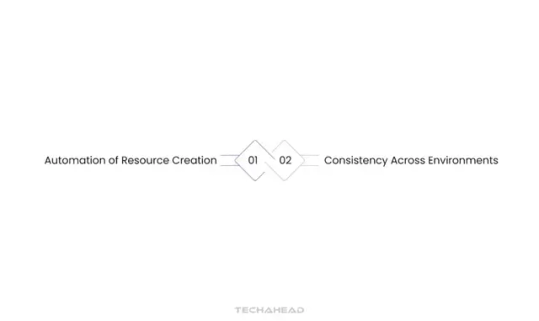
When it comes to provisioning infrastructure, tools like Terraform, AWS CloudFormation, or Ansible play a crucial role. They read the code that defines the infrastructure and automatically create the necessary resources. Whether it’s launching servers, setting up databases, or configuring entire networks, these tools automate every step. This eliminates manual setup, reducing human errors and speeding up deployment times. Automated provisioning also ensures that the infrastructure is consistently deployed across different environments, maintaining reliability.
CI/CD Integration
In modern DevOps practices, infrastructure must keep up with the fast pace of software releases. With Infrastructure as Code, integration with Continuous Integration/Continuous Deployment (CI/CD) pipelines is seamless. As developers push updates to the application code, the corresponding infrastructure changes can also be tested and deployed automatically. This means that infrastructure evolves alongside the application, staying up-to-date and scalable. The automation in CI/CD pipelines ensures faster, more reliable deployments, enabling businesses to rapidly adapt to changes or scale their infrastructure as needed.
By leveraging Infrastructure as Code, organizations can not only automate infrastructure provisioning but also create resilient, scalable, and secure environments that evolve effortlessly with their applications.
Benefits of IaC in DevOps
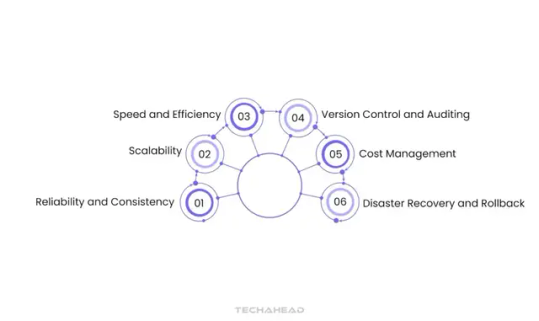
The Infrastructure as Code (IaC) model offers transformative benefits in the DevOps lifecycle. Let’s explore these advantages further in detail:
Reliability and Consistency
One of the primary challenges in traditional IT environments is inconsistent configurations across various environments, such as development, testing, and production. With IaC, infrastructure is written as code, ensuring that the same configuration is applied consistently. This eliminates environment-specific bugs and ensures uniform behavior across all stages. It addresses the “it works on my machine” issue, where an application behaves correctly in development but fails in other environments. By standardizing configurations, IaC reduces errors and enhances system stability over time.
Scalability
IaC makes scaling infrastructure remarkably simple. In a traditional setup, scaling meant manually adding resources like servers, storage, or network configurations—a process that could take hours or days. With IaC, this is achieved by updating the code. Whether scaling up for increased workloads or scaling down during periods of lower demand, these changes can be made instantly. Tools like Terraform or AWS CloudFormation ensure that the infrastructure dynamically adapts based on changes in the code, allowing businesses to scale rapidly without delays or errors.
Speed and Efficiency
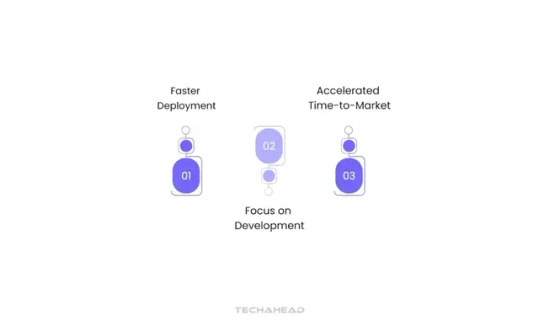
IaC accelerates the deployment process. Traditionally, setting up infrastructure involved multiple manual tasks—configuring servers, installing software, and managing network settings—all of which could take significant time. IaC automates these steps, enabling the infrastructure to be provisioned in minutes, not days. This allows development teams to focus on building and deploying applications rather than managing infrastructure. The increased speed and reduced overheads lead to more rapid development cycles and faster time-to-market.
Version Control and Auditing
Every infrastructure change is recorded in version control systems (VCS) like Git. This means that every modification—whether it’s adding a server or tweaking a network configuration—is documented and traceable. Teams can see exactly who made what change and when. This level of transparency helps in auditing and troubleshooting. Additionally, in the event of a problem, teams can revert to a previous version of the infrastructure with ease, minimizing risks during updates or deployments.
Disaster Recovery and Rollback
In the event of a failure, the recovery process is vastly simplified with IaC. If an infrastructure change leads to unexpected issues, teams can easily roll back to the last known stable version of the infrastructure code stored in the version control system. This rollback capability is crucial for minimizing downtime and preventing prolonged disruptions. IaC ensures faster recovery and improves resilience, making it a powerful tool in disaster recovery planning.
Cost Management
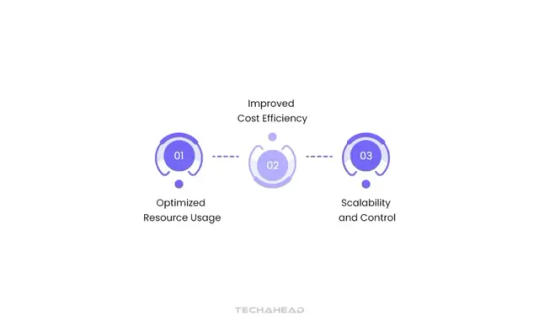
Effective resource management is critical for cost control, especially in cloud computing. IaC allows organizations to create temporary environments for specific tasks, such as testing new features. Once testing is completed, these environments can be automatically de-provisioned to avoid incurring unnecessary costs. This level of flexibility ensures that resources are only utilized when necessary, optimizing cloud spending and preventing resource wastage. The ability to automate provisioning and decommissioning through code significantly enhances cost efficiency.
Overall, the Infrastructure as Code approach drives consistency, efficiency, and scalability across IT operations, making it indispensable for modern DevOps practices. It empowers teams to innovate faster while maintaining robust control over infrastructure, ensuring that businesses can scale seamlessly and respond quickly to changing demands.
Common Tools for Infrastructure as Code
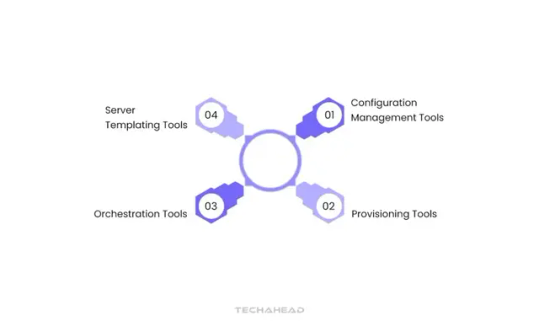
DevOps team rely on four main types of Infrastructure as Code in DevOps tools to streamline operations. Each tool serves a distinct purpose in automating and managing infrastructure.
Configuration Management Tools
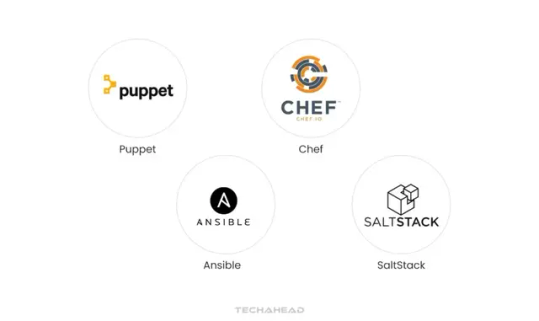
Configuration management tools focus on automating software installation and managing configurations on existing servers. By ensuring uniform setups across all servers, they eliminate manual errors and configuration drifts.
Puppet
Puppet shares many similarities with Chef, standing out among Infrastructure as Code in DevOps tools. It’s integral to countless CI/CD pipelines that DevOps engineers rely on. Puppet uses a Domain Specific Language (DSL) based on Ruby, allowing you to declare the desired state of your infrastructure and its functionalities. It then automatically determines the most efficient path to achieve the specified configuration.
If there are any deviations from this desired state, Puppet actively monitors and corrects these changes, restoring the infrastructure to its intended setup. This powerful open-source solution supports major cloud platforms like Google Cloud Platform (GCP), Microsoft Azure, and Amazon Web Services (AWS), enabling seamless automation across diverse environments.
Key Features:
Puppet employs a Ruby DSL for defining system configurations, making scripting more intuitive and powerful.
It offers an extensive module library through Puppet Forge, enhancing functionality and customization.
Puppet’s idempotent nature ensures that applying a configuration repeatedly yields consistent results, boosting stability.
Chef
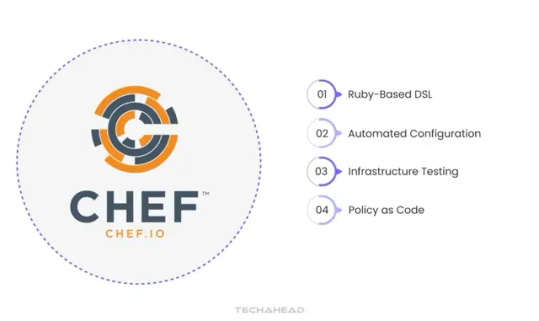
Chef is a powerful automation platform that converts Infrastructure as Code in DevOps into reality. It enables the automation of building, deploying, and managing IT infrastructure, providing organizations with precise control over configurations. This control drives greater agility and operational efficiency in IT processes, empowering teams to innovate rapidly.
Key Features:
Chef utilizes a Ruby-based DSL to script system configurations, streamlining the automation process.
It automated server configuration and deployment, reducing manual intervention and potential errors.
Chef supports infrastructure testing with tools like ChefSpec and InSpec, ensuring reliable code quality.
Policy as Code: It allows teams to define policies and configurations as code, enhancing transparency and consistency across deployments,
Ansible
Ansible serves as a versatile IT automation engine, ideal for application deployment, configuration management, and orchestration tasks. Although not a traditional Infrastructure as Code in DevOps tool, ANsible’s adaptability allows it to provision IaC resources using various collections. This capability bridges the gap between IT automation and IaC, offering a unified approach to managing both software and infrastructure with a single toolset.
Key Features:
Ansible operates without requiring agents on target nodes, simplifying the automation process.
YAML-based automation: It leverages YAML to define tasks, making configurations straightforward and readable.
Modular design: Ansible’s modular structure supports reusable modules, enhancing flexibility for diverse automation scenarios.
SaltStack
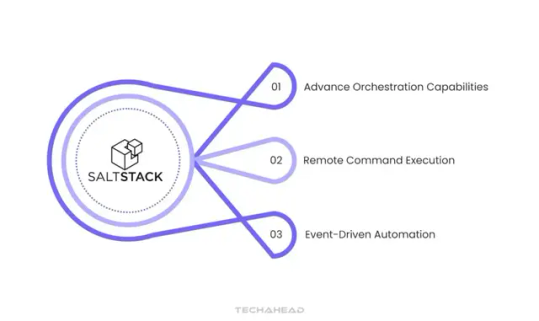
SaltSTack, commonly referred to as Salt, is a robust Python-based tool specializing in Infrastructure as Code in DevOps. It’s designed for efficient configuration management and remote command execution, excelling in both Cloud engineering and on-premises environments.
Key Features:
Advance Orchestration Capabilities: SaltStack supports intricate orchestration and configuration management across diverse environments, ensuring seamless infrastructure automation.
Remote Command Execution: It allows direct command execution on remote systems, streamlining control over distributed infrastructure.
Event-Driven Automation: SaltStack reacts to various system events, triggering automated responses to ensure dynamic and responsive infrastructure management.
Server Templating Tools
Server templating tools allow teams to create reusable templates that define a server’s configuration. These templates act as blueprints, standardizing how new servers are built and ensuring they meet predefined specifications.
Vagrant
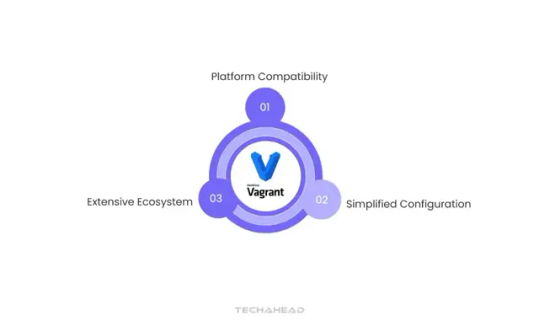
Vagrant streamlines the creation and management of virtual machines, enhancing Infrastructure as Code in DevOps practices by ensuring consistent environments. It allows DevOps engineers to easily share VM setups, promoting seamless collaboration and reducing environment-related issues.
Key Features:
Platform Compatibility: Integrates with VirtualBox, VMware, Docker, AWS, and other major platforms for versatile virtual machine deployment.
Simplified Configuration: Uses a straightforward Vagrantfile to define and configure environments, making setup intuitive and user-friendly.
Extensive Ecosystem: Offers a variety of preconfigured boxes for different operating systems, accelerating deployment with ready-to-use templates.
Orchestration Tools
Orchestration tools manage the coordination between different infrastructure components, ensuring seamless interactions in complex environments. They help
Automate workflows
Enabling multiple services to communicate
Work together efficiently
Kubernetes
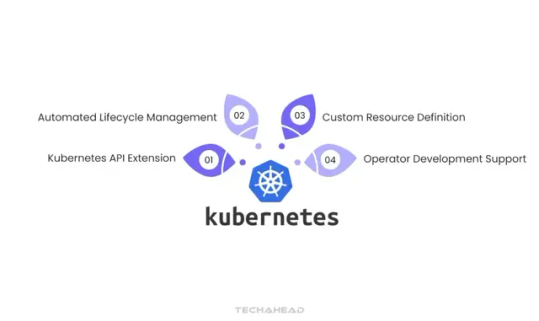
Kubernetes act as specialized controllers that expand the Kubernetes API to handle complex stateful applications, advancing Infrastructure as Code in DevOps. Major cloud platforms like AWS, Microsoft Azure, Google Cloud, and Oracle Cloud Infrastructure offer tailored K8s operators to efficiently provision infrastructure resources.
Key Features:
Kubernetes API Extension: Enhances the Kubernetes API to manage specific application needs, improving operational flexibility.
Automated Lifecycle Management: Simplifies the management of complex stateful applications, ensuring seamless operation within Kubernetes clusters.
Custom Resource Definition: Empowers teams to create and manage custom resources in Kubernetes, boosting control over infrastructure setups.
Operator Development Support: Facilities building new operators, promoting innovation in infrastructure automation.
Provisioning Tools
Provisioning tools focus on the initial creation and configuration of infrastructure components like servers, networks, and storage. They automate the setup process, ensuring a faster and more reliable infrastructure deployment.
Terraform
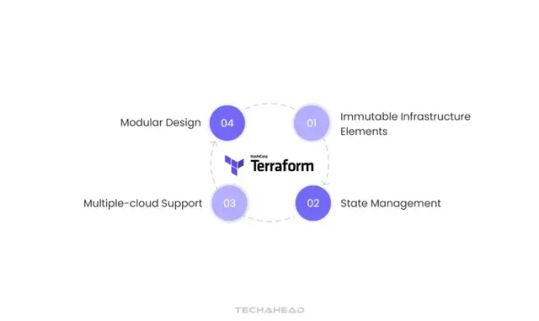
Terraform stands as a leading tool in Infrastructure as Code in DevOps, enabling seamless infrastructure management across multiple cloud platforms using a straightforward declarative language.
Key Features:
Immutable Infrastructure Elements: Ensures consistent configurations, reducing the risk of drift in infrastructure settings.
State Management: Tracks infrastructure state to maintain stability and manage resource dependencies efficiently.
Multiple-cloud Support: Offers compatibility with various cloud providers, enabling diverse infrastructure management.
Modular Design: Promotes reusability and efficiency by allowing the creation of modular code components.
AWS CloudFormation
AWS CloudFormation offers a unified approach to defining and provisioning infrastructure within AWS cloud services, leveraging Infrastructure as Code in DevOps to streamline cloud resource management. This service, tailored exclusively for AWS, ensures a smooth and automated deployment experience, keeping pace with AWS’s latest features and services.
Key Features:
AWS Integration: Seamlessly aligns with AWS services, delivering optimizing support for a wide range of resources.
Declarative Templates: Utilizes JSON or YAML formats to simplify infrastructure definitions.
Change Management: Offers preview capabilities to assess and manage changes before applying them to your infrastructure.
Stack Organization: Groups resources into manageable stacks, enhancing clarity and ease of resource handling.
Comprehensive Resource Support: Extensively support AWS resources, ensuring compatibility with the latest offerings.
These tools play a critical role in Infrastructure as Code in DevOps, enhancing automation, efficiency, and consistency in managing IT infrastructure. They empower teams to build, deploy, and scale environments effortlessly, driving innovation and accelerating development cycles.
Best Practices for Implementation of IaC in DevOps
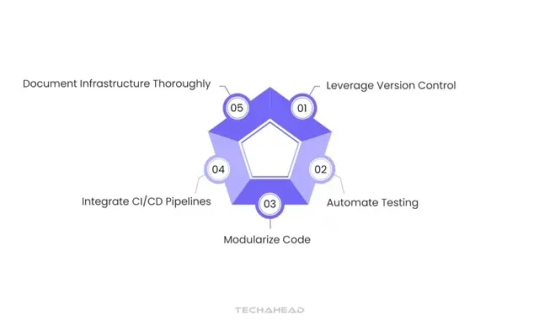
Let’s delve deeper into the best practices for implementing Infrastructure as Code in DevOps, enhancing each point to maximize its effectiveness in a DevOps environment:
Leverage Version Control
Integrating IaC configurations into version control systems like Git is crucial. This practice not only prevents rework by storing every infrastructure update but also provides a clear audit trail of changes. It allows multiple team members to collaborate seamlessly, managing access, tracking revisions, and rolling back to a previous state if needed. Version control acts as both a safeguard and a robust change management system
Automate Testing
Automated testing is vital to maintaining the integrity of your infrastructure setup. Use tools like Terratest to test Terraform modules or AWS Config to check resource compliance against best practices. Automated tests catch issues early, preventing faulty configurations from disrupting deployments. By validating infrastructure before it’s deployed, you ensure that changes won’t lead to instability or errors in production environments.
Modularize Code
Modularization means breaking IaC code into distinct, reusable components. Instead of having a monolithic script, create small, independent modules that focus on specific tasks. This modular approach simplifies updates since you only need to modify individual parts without affecting the entire codebase. It also promotes code reusability, making it easier to scale your infrastructure by reusing proven modules.
Integrate CI/CD Pipelines
Integrating IaC into your CI/CD pipeline is essential for the continuous delivery of infrastructure changes. By embedding testing, validation, and deployment of IaC into the CI/CD process, you ensure that the infrastructure code is automatically validated before deployment. This integration keeps infrastructure and application code in sync, reducing discrepancies and accelerating delivery cycles.
Document Infrastructure Thoroughly
Comprehensive documentation is the backbone of effective Infrastructure as Code in DevOps. Detailing configurations, architectural decisions, and setup procedures aids in knowledge sharing across the team. Proper documentation simplifies troubleshooting and onboarding, helping new team members understand the infrastructure’s architecture and its dependencies quickly.
Implementing these best practices fortifies Infrastructure as Code in DevOps by enhancing collaboration, minimizing risks, and ensuring scalable and consistent deployments. This structured approach to managing IT infrastructure accelerates development cycles and drives innovation in dynamic cloud environments.
Conclusion
Infrastructure as Code (IaC) has significantly reshaped the way DevOps operates. It empowers teams to manage IT infrastructure with the same speed and precision as software development—using automation for consistent results. This approach enables organizations to streamline processes, creating scalable and efficient workflows while managing their infrastructure with ease. This strategy is particularly crucial for Infrastructure as Code in DevOps, especially in web application development, where rapid delivery and infrastructure reliability are non-negotiable.
In this DevOps landscape, employing Infrastructure as Code in DevOps ensures that teams build high-quality applications while maintaining a resilient, scalable, and secure infrastructure. By adopting the right tools and following best practices, teams can harness IaC to create and manage infrastructures that support swift software delivery cycles.
Relying on IaC isn’t just an option in today’s agile, cloud-first environment; it’s essential for staying competitive. If you’re a DevOps professional yet to incorporate Infrastructure as Code in DevOps into your workflow, now is the time to act.
Have a web or mobile app development project that demands expert developers? Connect with us for a free technical consultation.
Source URL: https://www.techaheadcorp.com/blog/infrastructure-as-code-iac-in-devops-the-key-to-streamlined-devops-infrastructure-management/#h-common-tools-for-infrastructure-as-code
0 notes
Text
Cloud Automation is crucial for optimizing IT operations in multi-cloud environments. Tools such as Ansible, Terraform, Kubernetes, and AWS CloudFormation enable businesses to streamline workflows, automate repetitive tasks, and enhance infrastructure management. These solutions provide efficiency and scalability, making them indispensable for modern cloud management.
#cloud automation tools#IT operations#seamless IT automation#Ansible#Terraform#AWS CloudFormation#Kubernetes#multi-cloud management#cloud provisioning#infrastructure automation#DevOps tools#cloud migration
0 notes
Text
#AWS#AWS Step Functions#Step Functions#AWS CodePipeline#CodePipeline#Amazon EventBridge#EventBridge#Approval Flow#Approval Action#AWS CloudFormation#CloudFormation#AWS Lambda#Lambda#CI/CD#DevOps
0 notes
Text
AWS Devops Services
Software delivery in cloud settings may be automated, scaled, and managed more efficiently with the help of AWS DevOps services. Among these services is infrastructure as code (IaC), which lets programmers use version-controlled scripts to define and maintain infrastructure. Software releases are made fast and dependable by automating the testing and deployment of applications through continuous integration and continuous delivery (CI/CD) pipelines. Applications can operate reliably in a variety of contexts thanks to the management of microservices made possible by containerization and orchestration technologies. Teams can take proactive measures to resolve problems by using real-time insights into application performance that are provided by monitoring and logging services. Auto-scaling, which modifies resources in response to demand to maintain highly available and economical applications, is another crucial part of AWS DevOps services. Teams can comply with industry requirements by using automated controls and real-time auditing to include security and compliance in the DevOps workflow. Version control systems and collaboration tools are also essential since they let teams collaborate easily and monitor changes to infrastructure and code. With the help of these AWS DevOps services, businesses can create, launch, and maintain apps effectively, promoting an innovative and continuous improvement culture.
#AWS#DevOps#CloudComputing#AWSDevOps#CloudInfrastructure#Automation#CI/CD#InfrastructureAsCode#AWSLambda#Kubernetes#CloudFormation#Terraform#AWSCloud#Serverless#AWSCommunity
0 notes
Text
Juggling numerous services for the IT infrastructure can be quite a challenge. Dealing with multiple AWS resources might eat up valuable time that could be spent on developing applications. The solution is AWS CloudFormation.
0 notes
Text
Navigating the DevOps Landscape: Opportunities and Roles
DevOps has become a game-changer in the quick-moving world of technology. This dynamic process, whose name is a combination of "Development" and "Operations," is revolutionising the way software is created, tested, and deployed. DevOps is a cultural shift that encourages cooperation, automation, and integration between development and IT operations teams, not merely a set of practises. The outcome? greater software delivery speed, dependability, and effectiveness.

In this comprehensive guide, we'll delve into the essence of DevOps, explore the key technologies that underpin its success, and uncover the vast array of job opportunities it offers. Whether you're an aspiring IT professional looking to enter the world of DevOps or an experienced practitioner seeking to enhance your skills, this blog will serve as your roadmap to mastering DevOps. So, let's embark on this enlightening journey into the realm of DevOps.
Key Technologies for DevOps:
Version Control Systems: DevOps teams rely heavily on robust version control systems such as Git and SVN. These systems are instrumental in managing and tracking changes in code and configurations, promoting collaboration and ensuring the integrity of the software development process.
Continuous Integration/Continuous Deployment (CI/CD): The heart of DevOps, CI/CD tools like Jenkins, Travis CI, and CircleCI drive the automation of critical processes. They orchestrate the building, testing, and deployment of code changes, enabling rapid, reliable, and consistent software releases.
Configuration Management: Tools like Ansible, Puppet, and Chef are the architects of automation in the DevOps landscape. They facilitate the automated provisioning and management of infrastructure and application configurations, ensuring consistency and efficiency.
Containerization: Docker and Kubernetes, the cornerstones of containerization, are pivotal in the DevOps toolkit. They empower the creation, deployment, and management of containers that encapsulate applications and their dependencies, simplifying deployment and scaling.
Orchestration: Docker Swarm and Amazon ECS take center stage in orchestrating and managing containerized applications at scale. They provide the control and coordination required to maintain the efficiency and reliability of containerized systems.
Monitoring and Logging: The observability of applications and systems is essential in the DevOps workflow. Monitoring and logging tools like the ELK Stack (Elasticsearch, Logstash, Kibana) and Prometheus are the eyes and ears of DevOps professionals, tracking performance, identifying issues, and optimizing system behavior.
Cloud Computing Platforms: AWS, Azure, and Google Cloud are the foundational pillars of cloud infrastructure in DevOps. They offer the infrastructure and services essential for creating and scaling cloud-based applications, facilitating the agility and flexibility required in modern software development.
Scripting and Coding: Proficiency in scripting languages such as Shell, Python, Ruby, and coding skills are invaluable assets for DevOps professionals. They empower the creation of automation scripts and tools, enabling customization and extensibility in the DevOps pipeline.
Collaboration and Communication Tools: Collaboration tools like Slack and Microsoft Teams enhance the communication and coordination among DevOps team members. They foster efficient collaboration and facilitate the exchange of ideas and information.
Infrastructure as Code (IaC): The concept of Infrastructure as Code, represented by tools like Terraform and AWS CloudFormation, is a pivotal practice in DevOps. It allows the definition and management of infrastructure using code, ensuring consistency and reproducibility, and enabling the rapid provisioning of resources.

Job Opportunities in DevOps:
DevOps Engineer: DevOps engineers are the architects of continuous integration and continuous deployment (CI/CD) pipelines. They meticulously design and maintain these pipelines to automate the deployment process, ensuring the rapid, reliable, and consistent release of software. Their responsibilities extend to optimizing the system's reliability, making them the backbone of seamless software delivery.
Release Manager: Release managers play a pivotal role in orchestrating the software release process. They carefully plan and schedule software releases, coordinating activities between development and IT teams. Their keen oversight ensures the smooth transition of software from development to production, enabling timely and successful releases.
Automation Architect: Automation architects are the visionaries behind the design and development of automation frameworks. These frameworks streamline deployment and monitoring processes, leveraging automation to enhance efficiency and reliability. They are the engineers of innovation, transforming manual tasks into automated wonders.
Cloud Engineer: Cloud engineers are the custodians of cloud infrastructure. They adeptly manage cloud resources, optimizing their performance and ensuring scalability. Their expertise lies in harnessing the power of cloud platforms like AWS, Azure, or Google Cloud to provide robust, flexible, and cost-effective solutions.
Site Reliability Engineer (SRE): SREs are the sentinels of system reliability. They focus on maintaining the system's resilience through efficient practices, continuous monitoring, and rapid incident response. Their vigilance ensures that applications and systems remain stable and performant, even in the face of challenges.
Security Engineer: Security engineers are the guardians of the DevOps pipeline. They integrate security measures seamlessly into the software development process, safeguarding it from potential threats and vulnerabilities. Their role is crucial in an era where security is paramount, ensuring that DevOps practices are fortified against breaches.
As DevOps continues to redefine the landscape of software development and deployment, gaining expertise in its core principles and technologies is a strategic career move. ACTE Technologies offers comprehensive DevOps training programs, led by industry experts who provide invaluable insights, real-world examples, and hands-on guidance. ACTE Technologies's DevOps training covers a wide range of essential concepts, practical exercises, and real-world applications. With a strong focus on certification preparation, ACTE Technologies ensures that you're well-prepared to excel in the world of DevOps. With their guidance, you can gain mastery over DevOps practices, enhance your skill set, and propel your career to new heights.
11 notes
·
View notes
Text
aws online training in ameerpet

Amazon Web Services (AWS) is a widely used cloud computing platform that provides a variety of services and tools for building, deploying, and managing applications in the cloud. As the demand for skilled AWS professionals continues to grow, APEC IT Training offers comprehensive AWS training programs that are designed to teach participants the skills necessary to become proficient AWS developers and administrators.The AWS training program offered by APEC IT Training covers a wide range of topics, including AWS core services, security and compliance, migration, and automation. Participants are also introduced to more advanced topics such as DevOps, machine learning, and big data.
The course usually starts with the basics of AWS, including AWS Identity and Access Management (IAM), Elastic Compute Cloud (EC2), and Simple Storage Service (S3). Participants then move on to more advanced topics such as building scalable and fault-tolerant applications using AWS services such as Elastic Load Balancing, Auto Scaling, and Route 53.The training program also covers best practices for securing and complying with AWS services, migrating applications to AWS, and automating infrastructure using AWS CloudFormation and AWS CodePipeline.
visit: http://www.apectraining.com/aws/
2 notes
·
View notes
Text
Best DevOps Certifications for Elevating Your Skills
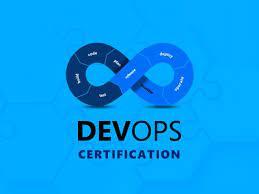
DevOps is a rapidly growing area that bridging the gap between IT and software development operations, encouraging the culture which is constantly integrating, automated and quick delivery. If you're a novice looking to start your career in the field or a seasoned professional seeking to increase your knowledge by earning the DevOps certification can greatly improve your job prospects.
This article will discuss the most beneficial DevOps certifications to be awarded in 2025 which will aid you in enhancing your capabilities and remain ahead in the ever-changing tech sector.
Why Get a DevOps Certification?
Certifications in DevOps demonstrate your expertise and experience of automation, cloud computing pipelines, CI/CD pipelines and infrastructure in code and many more. The reasons why getting a certification is useful:
Improved Career Opportunities : Certified DevOps professionals are highly sought after as top companies seek experienced engineers.
Higher Salary - Potential : The Accredited DevOps engineers earn considerably higher salaries than professionals who are not certified.
A better set of skills : Certifications can assist you in mastering tools such as Kubernetes, Docker, Ansible, Jenkins, and Terraform.
Higher job security : With the swift acceptance of DevOps methods, certified professionals have a better position in the market.
Top DevOps Certifications in 2025
1. AWS Certified DevOps Engineer – Professional
Best for: Cloud DevOps Engineers
Skills Covered: AWS automation, CI/CD pipelines, logging, and monitoring
Cost: $300
Why Choose This Certification? AWS is a dominant cloud provider, and this certification validates your expertise in implementing DevOps practices within AWS environments. It's ideal for those working with AWS services like EC2, Lambda, CloudFormation, and CodePipeline.
2. Microsoft Certified: DevOps Engineer Expert
Best for: Azure DevOps Professionals
Skills Covered: Azure DevOps, CI/CD, security, and monitoring
Cost: $165
Why Choose This Certification? If you're working in Microsoft Azure environments, this certification is a must. It covers using Azure DevOps Services, infrastructure as code with ARM templates, and managing Kubernetes deployments in Azure.
3. Google Cloud Professional DevOps Engineer
Best for: Google Cloud DevOps Engineers
Skills Covered: GCP infrastructure, CI/CD, monitoring, and incident response
Cost: $200
Why Choose This Certification? Google Cloud is growing in popularity, and this certification helps DevOps professionals validate their skills in site reliability engineering (SRE) and continuous delivery using GCP.
4. Kubernetes Certifications (CKA & CKAD)
Best for: Kubernetes Administrators & Developers
Skills Covered: Kubernetes cluster management, networking, and security
Cost: $395 each
Why Choose These Certifications? Kubernetes is the backbone of container orchestration, making these certifications essential for DevOps professionals dealing with cloud-native applications and containerized deployments.
CKA (Certified Kubernetes Administrator): Best for managing Kubernetes clusters.
CKAD (Certified Kubernetes Application Developer): Best for developers deploying apps in Kubernetes.
5. Docker Certified Associate (DCA)
Best for: Containerization Experts
Skills Covered: Docker containers, Swarm, storage, and networking
Cost: $195
Why Choose This Certification? Docker is a key component of DevOps workflows. The DCA certification helps you gain expertise in containerized applications, orchestration, and security best practices.
6. HashiCorp Certified Terraform Associate
Best for: Infrastructure as Code (IaC) Professionals
Skills Covered: Terraform, infrastructure automation, and cloud deployments
Cost: $70
Why Choose This Certification? Terraform is the leading Infrastructure as Code (IaC) tool. This certification proves your ability to manage cloud infrastructure efficiently across AWS, Azure, and GCP.
7. Red Hat Certified Specialist in Ansible Automation
Best for: Automation Engineers
Skills Covered: Ansible playbooks, configuration management, and security
Cost: $400
Why Choose This Certification? If you work with IT automation and configuration management, this certification validates your Ansible skills, making you a valuable asset for enterprises looking to streamline operations.
8. DevOps Institute Certifications (DASM, DOFD, and DOL)
Best for: DevOps Leadership & Fundamentals
Skills Covered: DevOps culture, processes, and automation best practices
Cost: Varies
Why Choose These Certifications? The DevOps Institute offers various certifications focusing on foundational DevOps knowledge, agile methodologies, and leadership skills, making them ideal for beginners and managers.
How to Choose the Right DevOps Certification?
Consider the following factors when selecting a Devops certification course online :
Your Experience Level: Beginners may start with Docker, Terraform, or DevOps Institute certifications, while experienced professionals can pursue AWS, Azure, or Kubernetes certifications.
Your Career Goals: If you work with a specific cloud provider, choose AWS, Azure, or GCP certifications. For automation, go with Terraform or Ansible.
Industry Demand: Certifications like AWS DevOps Engineer, Kubernetes, and Terraform have high industry demand and can boost your career.
Cost & Time Commitment: Some certifications require hands-on experience, practice labs, and exams, so choose one that fits your schedule and budget.
Final Thoughts
Certifications in DevOps can increase your technical knowledge and improve your chances of getting a job and enhance the amount you earn. No matter if you're looking to specialise in cloud-based platforms, automation, and containerization, you can find an option specifically designed for your specific career with Cloud Computing Certification Courses.
If you can earn at least one of these most prestigious DevOps-related certifications in 2025 You can establish yourself as a professional with a solid background in an industry that is rapidly changing.
0 notes
Text
Becoming an AWS Solutions Architect: A Comprehensive Guide
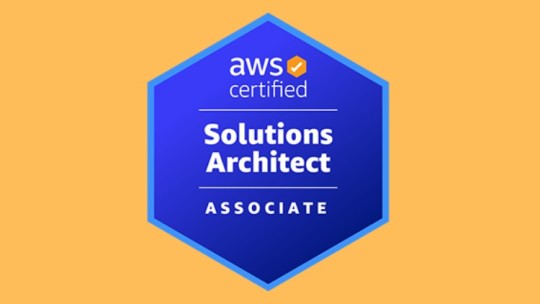
With the cloud age now, businesses are increasingly employing cloud computing platforms to cut costs, automate processes, and innovate. Among the first to pioneer cloud platforms is Amazon Web Services (AWS), which has numerous services that small, medium, and large enterprises can leverage. In order to effectively manage and optimize the services, businesses hire AWS Solutions Architects. What does it take to be an AWS Solutions Architect, and what is an AWS Solutions Architect in a business?
What is an AWS Solutions Architect?
AWS Solutions Architect is a technical professional who has the job to design, deploy, and execute scalable, secure, and high-performing cloud applications on Amazon Web Services. He cooperates with the development teams and clients in a manner that the architecture should be as per the business requirement and utilize the functionalities of AWS in the best way possible.
AWS Solutions Architects have knowledge in cloud architecture, system design, networking, and security. AWS Solutions Architects provide best-practice recommendations, cost savings, performance, and disaster recovery. AWS architects lead the way to help organizations realize maximum value of AWS in an effort to accomplish their missions.
Key Responsibilities of an AWS Solutions Architect
The work of an AWS Solutions Architect is diverse with numerous varied jobs. The essential jobs of an AWS Solutions Architect are:
Cloud Solution Design: Solutions Architects interact with stakeholders to receive business requirements and create cloud solutions that satisfy the requirements. It is performed by selecting suitable AWS services, stacking them in an open style, and designing highly available and fault-tolerant systems.
AWS Resource Monitoring and Management: They must monitor deploying and managing AWS resources such as EC2 instances, S3 buckets, RDS databases, etc. Resources must be ensured to scale as well as get optimized accordingly based on anticipated demands.
Security and Compliance: AWS Solutions Architects deploy cloud infrastructure with best-in-class security. They use encryption, access management, and identity practices to protect against sensitive information. They enable organizational compliance requirements.
Cost Optimization: Yet another of the biggest challenges of cloud deployment is managing costs. AWS Solutions Architects take into consideration usage patterns and suggest spending reduction without affecting performance. It could be selecting cost-effective services, rightsizing instances, or Reserved Instances.
Troubleshooting and Support: AWS Solutions Architects identify and fix cloud infrastructure issues. They collaborate with operations and development teams to address technical issues, ensuring the cloud environment remains up and running.
Skills and Certifications for AWS Solutions Architects
To become an AWS Solutions Architect, the candidate must possess technical as well as soft skills. Some of the most important skills and certifications are listed below:
Technical Skills
AWS Services: Strong knowledge of AWS services such as EC2, S3, Lambda, CloudFormation, VPC, and RDS.
Cloud Architecture: Experienced in designing scalable, highly available, and fault-tolerant architecture on AWS.
Networking and Security: Clear knowledge of networking fundamentals, firewalls, load balancers, and security controls in the AWS environment.
DevOps Tools: Knowledge of automated tools such as Terraform, Ansible, and CloudFormation for managing infrastructure.
Soft Skills
Problem-Solving: Solutions Architects need to have effective communication skills, wherein they can analyze and develop possible solutions to complex issues.
Communication: There is a requirement of good communication skills from the job with an effort to communicate clearly with development teams, stakeholders, and clients.
Project Management: Doing work under a series of varied projects and best possible ordering of tasks must be managed for the job.
Certifications
Experience is prioritized most, but certification aids in generating experience and interest towards learning accomplishments. AWS offers various certifications which are:
AWS Certified Solutions Architect – Associate: It is one of the recent additions in cloud architecture.
AWS Certified Solutions Architect – Professional: It is professional certification reflecting improved knowledge of AWS services and architecture design.
AWS Certified Security Specialty: It is AWS security practice-based certification.
Career Path and Opportunities for AWS Solutions Architects
The career of AWS Solutions Architects is slowly gaining momentum with more and more businesses shifting to the cloud. They begin as a cloud engineer, systems architect, or DevOps engineer in most scenarios. With the right skills, an AWS Solutions Architect can transition to senior positions such as cloud architect, enterprise architect, or even Chief Technology Officer (CTO).
Also, the majority of AWS Solutions Architects are independent consultants for various companies, and some are contracted by large companies, consulting firms, or tech companies. The profession has vast opportunities for advancement as well as work-life balance.
Conclusion
One must have a mix of technical expertise, problem-solving abilities, and in-depth knowledge regarding AWS services as well as cloud computing principles to be an AWS Solutions Architect. With cheap, safe, and adaptable cloud architecture, AWS Solutions Architects enable cloud success for companies. With more and more companies jumping on the cloud bandwagon every day, there is an endless future waiting to be taken by talented AWS Solutions Architects in a company that is expanding exponentially with profits only remaining for the rest.
0 notes
Text
Cost Optimization in the Cloud: Smart Strategies to Reduce Expenses Without Compromising Performance
Cloud computing offers scalability and flexibility, but without proper management, costs can quickly spiral out of control. This blog explores smart strategies to optimize cloud costs while maintaining high performance, ensuring that your organization gets the most value from its cloud investments.
Why Cloud Cost Optimization Matters
As cloud adoption grows, managing expenses becomes essential for businesses to avoid unnecessary costs and maximize ROI. Effective cost optimization ensures that you pay only for what you use, while still meeting performance and scalability needs.
Key Strategies for Cloud Cost Optimization
1. Right-Sizing Resources
Analyze and adjust your cloud resources to match actual usage. Avoid over-provisioning by selecting the right instance types, sizes, and storage options.
2. Use Reserved Instances and Savings Plans
Commit to long-term usage with Reserved Instances or Savings Plans to benefit from significant discounts compared to on-demand pricing.
3. Automate Resource Scaling
Implement auto-scaling to dynamically adjust resources based on demand, preventing overuse during peak times and reducing costs during low usage periods.
4. Leverage Spot Instances
Utilize Spot Instances for non-critical workloads, offering up to 90% savings over on-demand instances.
5. Implement Infrastructure as Code (IaC)
IaC tools like Terraform or AWS CloudFormation automate the provisioning of cost-efficient cloud infrastructure, ensuring consistency and reducing manual errors.
Monitoring and Optimization Tools
AWS Cost Explorer: Visualizes, analyzes, and manages AWS costs and usage.
Azure Cost Management and Billing: Monitors and controls Azure spending with cost analysis and budgeting.
Google Cloud Cost Tools: Offers budget tracking, cost breakdowns, and resource recommendations.
Best Practices for Continuous Cost Optimization
1. Set Budgets and Alerts
Define cloud budgets and receive alerts when spending exceeds thresholds to prevent unexpected costs.
2. Monitor Unused and Idle Resources
Identify and terminate idle resources such as unattached storage volumes or underutilized instances.
3. Optimize Storage Costs
Use cost-effective storage options like object storage for infrequently accessed data and implement lifecycle policies for automatic data archiving.
4. Implement Cost Allocation Tags
Tag cloud resources to track and allocate costs across departments, projects, and environments accurately.
5. Regular Cost Reviews
Conduct regular reviews of cloud costs and usage, adjusting resources and configurations as needed to ensure continuous optimization.
Challenges in Cloud Cost Optimization and How to Overcome Them
Complex Cloud Environments: Use automated tools for real-time monitoring and cost analysis.
Unpredictable Usage Patterns: Implement auto-scaling and usage alerts.
Lack of Visibility: Utilize cloud-native cost management tools to gain clear insights into spending.
Conclusion
Optimizing cloud costs doesn't mean compromising performance. By adopting smart strategies like right-sizing, using reserved instances, and leveraging automation tools, businesses like Salzen can achieve significant cost savings while maintaining efficient and reliable cloud operations.
0 notes
Text
Transform Your Business with DevOps Consulting Services - Goognu

In an increasingly fast-paced and competitive digital landscape, organizations must focus on efficiency, speed, and collaboration to stay ahead. Achieving this means rethinking traditional development and operations methods. DevOps, a methodology that integrates development and IT operations, is the solution that enables companies to deliver high-quality software quickly and reliably. However, adopting DevOps requires specialized knowledge and tools. That’s where Goognu’s DevOps Consulting Services come in.
As a leading DevOps Consulting Company, we help businesses streamline their development processes, automate workflows, and implement cutting-edge DevOps practices that foster collaboration and continuous improvement.
What is DevOps and Why Your Business Needs It?
DevOps is a culture and set of practices that emphasizes collaboration between development and operations teams to enable faster and more reliable software delivery. By breaking down traditional silos between development and operations, DevOps ensures that software is delivered more quickly and with higher quality. Core DevOps practices include:
Collaboration: Encouraging communication between development and operations teams to ensure alignment and shared goals.
Automation: Automating manual processes to improve speed and reduce human error, especially in testing, deployment, and monitoring.
Continuous Integration (CI) and Continuous Delivery (CD): Ensuring code is integrated, tested, and deployed quickly and efficiently.
Monitoring and Feedback: Continuously monitoring software in production to gather feedback and make improvements.
By adopting DevOps, businesses can experience:
Faster Delivery Cycles: With automated processes and streamlined collaboration, businesses can push updates and features to market faster.
Improved Software Quality: Automated testing and continuous feedback allow businesses to catch bugs earlier in the development cycle, improving overall quality.
Better Collaboration Across Teams: DevOps fosters a culture of cooperation between traditionally siloed development and operations teams.
Increased Efficiency: By automating repetitive tasks, teams can focus on more strategic and valuable work, which drives greater productivity.
However, implementing DevOps successfully requires expert guidance and strategic planning. This is where Goognu’s DevOps Consulting Services come in.
Why Goognu is the Right DevOps Consulting Company for You?
At Goognu, we specialize in offering DevOps Consulting Services that are tailored to the unique needs of your business. Our team of experienced consultants will guide you in implementing best practices, adopting the right tools, and aligning your DevOps strategy with your business goals. Here’s why Goognu is the ideal DevOps Consulting Company for your transformation:
1. Tailored DevOps Solutions
Every organization has unique challenges and goals, which is why our approach to DevOps consulting is highly personalized. We begin by understanding your existing processes, pain points, and objectives, and then design a customized DevOps strategy that aligns with your business vision. Whether you're looking to improve collaboration, speed up software releases, or enhance quality, Goognu’s DevOps Consulting Services are designed to meet your specific needs.
2. Expert Implementation of DevOps Tools
To succeed in DevOps, you need the right tools in place to automate processes, monitor performance, and integrate systems. As a leading DevOps Consulting Company, Goognu helps you select and implement the best DevOps tools to streamline your operations. Our team is well-versed in a wide range of industry-leading tools and platforms, including:
CI/CD Tools: Jenkins, GitLab CI, CircleCI, Travis CI, etc.
Infrastructure as Code (IaC): Terraform, AWS CloudFormation, Ansible, etc.
Containerization & Orchestration: Docker, Kubernetes, OpenShift, etc.
Monitoring & Logging: Prometheus, Grafana, ELK Stack, etc.
Version Control Systems: Git, Bitbucket, GitHub, etc.
Our experts help integrate these tools into your development lifecycle, ensuring that tasks like continuous integration, testing, deployment, and monitoring are automated, reducing errors and boosting efficiency.
3. Optimizing Your Software Development Lifecycle
DevOps is all about collaboration and efficiency, and Goognu’s DevOps Consulting Services help streamline your development lifecycle by breaking down silos between development and operations teams. Our consultants guide you through best practices for team collaboration, process management, and performance tracking, allowing your teams to work more cohesively. We ensure that your entire software development lifecycle—from planning to deployment—is efficient, automated, and aligned with business goals.
With Goognu’s guidance, your teams will be able to deliver high-quality software more quickly while fostering a culture of collaboration and shared responsibility.
4. Continuous Improvement and Automation
DevOps is not a one-time process but an ongoing journey. Goognu believes in continuous improvement, and our DevOps Consulting Services focus on setting up automated processes, continuous delivery pipelines, and monitoring systems that support long-term growth. We work with your teams to create feedback loops that allow you to continuously monitor performance, gather insights, and improve your processes, ensuring that you’re always improving and adapting to market changes.
We also emphasize automation to reduce repetitive, manual tasks, which boosts productivity, minimizes human error, and allows your teams to focus on more strategic work.
5. Security Integration with DevSecOps
In the modern development landscape, security can no longer be an afterthought. Goognu integrates security at every stage of your development process through DevSecOps practices. By embedding security directly into your CI/CD pipeline, we ensure that vulnerabilities are detected early and resolved before they reach production. Our DevOps Consulting Services will help you implement automated security checks, secure code reviews, and continuous security monitoring to protect your applications from threats while maintaining compliance with industry standards.
Take Your Business to the Next Level with Goognu’s DevOps Consulting Services
DevOps is a game-changing approach to software development, offering faster delivery, better quality, and more efficient collaboration across teams. But to truly realize the benefits of DevOps, your organization needs the expertise and strategic guidance of an experienced DevOps Consulting Company.
Goognu’s DevOps Consulting Services are here to help you adopt and implement DevOps practices, automate your development pipeline, and drive innovation across your organization. Our team of experts will work with you every step of the way to ensure your DevOps transformation is a success.
Contact Goognu today to schedule a consultation and begin your journey toward a more agile, efficient, and collaborative development process. Let us help you unlock the full potential of DevOps and take your business to the next level.
0 notes
Text
#AWS#AWS Step Functions#Step Functions#AWS Systems Manager#Systems Manager#SSM#Amazon EventBridge#EventBridge#Approval Flow#Approval Action#AWS CloudFormation#CloudFormation#AWS Lambda#Lambda#CI/CD#DevOps
0 notes
Text
DevOps Consulting Services Chennai
Introduction
In today's fast-paced digital world, businesses in Chennai are constantly seeking ways to enhance their software development and IT operations. DevOps consulting services provide a strategic approach to streamline workflows, improve collaboration, and automate processes, leading to faster and more efficient software delivery. This blog explores the significance of DevOps consulting services in Chennai and how they can transform businesses.
What is DevOps?
DevOps is a cultural and technological shift integrating development (Dev) and operations (Ops) teams to enhance collaboration, automation, and continuous delivery. It aims to break down silos, reduce deployment times, and ensure high-quality software releases.
Why Businesses in Chennai Need DevOps Consulting
Chennai, a major IT hub in India, hosts a wide range of businesses, from startups to enterprises, looking to leverage technology for growth. Implementing DevOps practices can be complex, requiring expertise in automation, cloud computing, and infrastructure management. This is where DevOps consulting services come into play, helping businesses:
Accelerate Deployment: Reduce time-to-market with automated pipelines and CI/CD practices.
Improve Collaboration: Enhance communication between development and operations teams.
Increase Efficiency: Automate repetitive tasks, reducing manual errors and downtime.
Ensure Scalability: Optimize cloud and on-premises infrastructure for better performance.
Enhance Security: Implement DevSecOps practices to integrate security into the development cycle.
Key Services Offered by DevOps Consultants in Chennai
Assessment & Strategy Planning
Analyzing current IT infrastructure
Identifying gaps and defining a roadmap
Implementing best DevOps practices
CI/CD Pipeline Implementation
Setting up automated testing and deployment pipelines
Ensuring faster and more reliable software releases
Cloud Consulting & Migration
Assisting in cloud adoption (AWS, Azure, Google Cloud)
Optimizing cloud resources for cost-effectiveness
Infrastructure as Code (IaC)
Automating infrastructure provisioning using Terraform, Ansible, or CloudFormation
Ensuring consistency and scalability
Monitoring & Security Integration
Implementing real-time monitoring solutions (Prometheus, Grafana, ELK Stack)
Enhancing security through DevSecOps practices
Containerization & Orchestration
Deploying applications using Docker and Kubernetes
Managing microservices efficiently
Choosing the Right DevOps Consulting Partner in Chennai
When selecting a DevOps consulting service provider, businesses should consider the following:
Experience & Expertise: Proven track record in DevOps implementations.
Technology Stack: Familiarity with the latest tools and platforms.
Customization: Tailored solutions based on business needs.
Support & Training: Post-implementation assistance and knowledge transfer.
Conclusion
Adopting DevOps is no longer an option but a necessity for businesses striving to stay competitive in the digital landscape. Chennai-based enterprises can leverage professional DevOps consulting services to streamline processes, enhance efficiency, and accelerate software delivery. Investing in the right DevOps strategy today will ensure long-term success and innovation.
1 note
·
View note
Text
DevOps in the Cloud: AWS, Azure, and Google Cloud Compared
DevOps in the Cloud: AWS, Azure, and Google Cloud Compared
Cloud computing has revolutionized DevOps, enabling organizations to build scalable, automated, and resilient infrastructure.

2. DevOps Features Comparison
📌 Continuous Integration & Deployment (CI/CD)
All three cloud providers offer CI/CD services to automate software builds, testing, and deployments:
AWS: CodePipeline (CI/CD) + CodeDeploy (deployment automation).
Azure: Azure DevOps (full DevOps suite with CI/CD, testing, repo management).
Google Cloud: Cloud Build (CI/CD) + Cloud Deploy (continuous deployment for Kubernetes).
🔹 Best For:
AWS — Ideal for integrating DevOps into AWS-native environments.
Azure — Best for enterprises using Microsoft tools (e.g., .NET, Active Directory).
Google Cloud — Strong Kubernetes-native CI/CD for cloud-native apps.
📌 Infrastructure as Code (IaC) & Automation
Infrastructure as Code (IaC) allows teams to manage cloud infrastructure programmatically.
AWS: CloudFormation (AWS-native IaC) + Terraform (third-party).
Azure: ARM Templates (Azure Resource Manager) + Terraform.
Google Cloud: Deployment Manager + Terraform.
🔹 Best For:
AWS — Cloud Formation simplifies AWS automation, but Terraform is more flexible.
Azure — ARM templates are Azure-native, but Terraform provides multi-cloud support.
Google Cloud — Terraform is widely used, and Deployment Manager is good for Google services.
📌 Containers & Kubernetes Support
Container orchestration is essential for microservices and DevOps.
AWS: EKS (Managed Kubernetes), ECS (Docker Containers).
Azure: Azure Kubernetes Service (AKS).
Google Cloud: GKE (Google Kubernetes Engine, leading Kubernetes service).
🔹 Best For:
AWS — Best for hybrid setups (EKS + ECS).
Azure — Strong integration with enterprise applications.
Google Cloud — Best Kubernetes-native platform (Google created Kubernetes!).
📌 Monitoring & Logging
DevOps relies on real-time monitoring and logging for performance and security insights.
AWS: CloudWatch (metrics, logs), X-Ray (tracing).
Azure: Azure Monitor (metrics, logging, alerts).
Google Cloud: Stackdriver (Cloud Monitoring & Logging).
🔹 Best For:
AWS — Best for AWS-native applications.
Azure — Enterprise-friendly monitoring with deep integration into Microsoft tools.
Google Cloud — Excellent real-time logging for Kubernetes workloads.
📌 Security & Compliance
Cloud security is a top priority for DevOps teams.
AWS: IAM (Identity & Access), Security Hub, GuardDuty.
Azure: Azure Security Center, Sentinel (SIEM), Active Directory.
Google Cloud: IAM, Security Command Center, BeyondCorp (zero-trust security).
🔹 Best For:
AWS — Best for granular security controls with IAM & GuardDuty.
Azure — Best for enterprises needing Active Directory integration.
Google Cloud — Best for zero-trust security & strong AI-based threat detection.
3. Choosing the Best Cloud for DevOps

4. Conclusion
All three cloud providers — AWS, Azure, and Google Cloud — offer strong DevOps capabilities. Your choice depends on:
✔️ AWS: Best for scalability, multi-cloud flexibility, and security. ✔️ Azure: Best for enterprise DevOps, Microsoft integration, and compliance. ✔️ Google Cloud: Best for cloud-native applications, Kubernetes, and AI-driven DevOps.
WEBSITE: https://www.ficusoft.in/devops-training-in-chennai/
0 notes
Text
DevOps for Beginners: Navigating the Learning Landscape
DevOps, a revolutionary approach in the software industry, bridges the gap between development and operations by emphasizing collaboration and automation. For beginners, entering the world of DevOps might seem like a daunting task, but it doesn't have to be. In this blog, we'll provide you with a step-by-step guide to learn DevOps, from understanding its core philosophy to gaining hands-on experience with essential tools and cloud platforms. By the end of this journey, you'll be well on your way to mastering the art of DevOps.

The Beginner's Path to DevOps Mastery:
1. Grasp the DevOps Philosophy:
Start with the Basics: DevOps is more than just a set of tools; it's a cultural shift in how software development and IT operations work together. Begin your journey by understanding the fundamental principles of DevOps, which include collaboration, automation, and delivering value to customers.
2. Get to Know Key DevOps Tools:
Version Control: One of the first steps in DevOps is learning about version control systems like Git. These tools help you track changes in code, collaborate with team members, and manage code repositories effectively.
Continuous Integration/Continuous Deployment (CI/CD): Dive into CI/CD tools like Jenkins and GitLab CI. These tools automate the building and deployment of software, ensuring a smooth and efficient development pipeline.
Configuration Management: Gain proficiency in configuration management tools such as Ansible, Puppet, or Chef. These tools automate server provisioning and configuration, allowing for consistent and reliable infrastructure management.
Containerization and Orchestration: Explore containerization using Docker and container orchestration with Kubernetes. These technologies are integral to managing and scaling applications in a DevOps environment.
3. Learn Scripting and Coding:
Scripting Languages: DevOps engineers often use scripting languages such as Python, Ruby, or Bash to automate tasks and configure systems. Learning the basics of one or more of these languages is crucial.
Infrastructure as Code (IaC): Delve into Infrastructure as Code (IaC) tools like Terraform or AWS CloudFormation. IaC allows you to define and provision infrastructure using code, streamlining resource management.
4. Build Skills in Cloud Services:
Cloud Platforms: Learn about the main cloud providers, such as AWS, Azure, or Google Cloud. Discover the creation, configuration, and management of cloud resources. These skills are essential as DevOps often involves deploying and managing applications in the cloud.
DevOps in the Cloud: Explore how DevOps practices can be applied within a cloud environment. Utilize services like AWS Elastic Beanstalk or Azure DevOps for automated application deployments, scaling, and management.
5. Gain Hands-On Experience:
Personal Projects: Put your knowledge to the test by working on personal projects. Create a small web application, set up a CI/CD pipeline for it, or automate server configurations. Hands-on practice is invaluable for gaining real-world experience.
Open Source Contributions: Participate in open source DevOps initiatives. Collaborating with experienced professionals and contributing to real-world projects can accelerate your learning and provide insights into industry best practices.
6. Enroll in DevOps Courses:
Structured Learning: Consider enrolling in DevOps courses or training programs to ensure a structured learning experience. Institutions like ACTE Technologies offer comprehensive DevOps training programs designed to provide hands-on experience and real-world examples. These courses cater to beginners and advanced learners, ensuring you acquire practical skills in DevOps.

In your quest to master the art of DevOps, structured training can be a game-changer. ACTE Technologies, a renowned training institution, offers comprehensive DevOps training programs that cater to learners at all levels. Whether you're starting from scratch or enhancing your existing skills, ACTE Technologies can guide you efficiently and effectively in your DevOps journey. DevOps is a transformative approach in the world of software development, and it's accessible to beginners with the right roadmap. By understanding its core philosophy, exploring key tools, gaining hands-on experience, and considering structured training, you can embark on a rewarding journey to master DevOps and become an invaluable asset in the tech industry.
7 notes
·
View notes
Text
Best DevOps Classes in Pune: AWS, Cloud, and More at CloudWorld
Are you looking for top-quality DevOps training in Pune? Whether you are a beginner or an experienced professional looking to enhance your DevOps skills, Pune offers some of the best DevOps training institutes in India. At CloudWorld, we provide AWS DevOps classes in Pune and help individuals and organizations streamline their processes using cutting-edge DevOps practices.
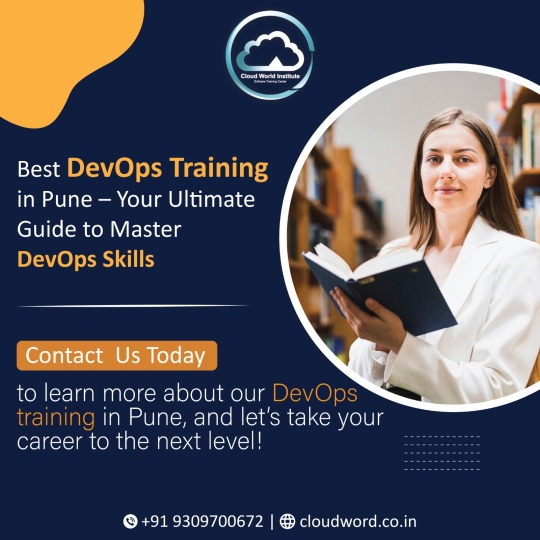
Why Choose DevOps Training in Pune?
Pune is quickly becoming a hub for IT training, especially in emerging technologies like DevOps. As organizations continue to adopt DevOps practices to improve software development, deployment, and collaboration, demand for skilled professionals is growing rapidly. DevOps classes in Pune are designed to equip students with the necessary skills to excel in this field.
At CloudWorld, we focus on providing industry-relevant, practical knowledge in our DevOps course in Pune. Our courses are tailored to suit both beginners and professionals, ensuring everyone gets the most out of the training.
What is DevOps and Why is it Important?
DevOps is a set of practices that combine software development (Dev) and IT operations (Ops). The goal of DevOps is to shorten the development lifecycle and deliver high-quality software continuously. By fostering better collaboration between development and operations teams, DevOps enables faster releases, improved quality, and greater efficiency.
Choosing the right DevOps training in Pune can give you the foundation to build these skills and open up a wide range of career opportunities in this rapidly growing field.
Top Features of Our DevOps Course in Pune
Comprehensive CurriculumOur DevOps training in Pune covers everything from version control, continuous integration, and continuous deployment to configuration management, monitoring, and cloud technologies. With hands-on experience, you’ll be ready to tackle real-world DevOps challenges.
AWS DevOps Classes in PuneAWS (Amazon Web Services) has become one of the leading cloud platforms, and integrating DevOps practices with AWS tools is essential. Our AWS DevOps classes in Pune focus on AWS services like EC2, S3, Lambda, and CloudFormation, preparing you for roles that require cloud expertise.
Industry Experts as TrainersWe understand that learning from experienced professionals is crucial. That’s why our trainers at CloudWorld are seasoned industry experts who bring their years of experience into the classroom. They share best practices and insights to ensure you are ready for the workforce.
Placement AssistanceAt CloudWorld, we are committed to your success. Our DevOps classes in Pune with placement support give you access to a wide network of hiring companies. We offer resume building, interview preparation, and job placement assistance to help you land your dream job in DevOps.
Hands-on ProjectsWe believe in learning by doing. Our DevOps training institute in Pune includes various live projects where you can apply your skills to real-world scenarios. This hands-on approach ensures that you are job-ready and can handle any challenge thrown your way.
Flexible Timing and Online OptionsAt CloudWorld, we understand that everyone has different schedules. That’s why we offer flexible timings for our DevOps classes in Pune and even online training options for those who prefer to learn at their own pace from anywhere in the world.
Why CloudWorld is the Best DevOps Training Institute in Pune?
With so many DevOps training institutes in Pune, it can be hard to choose the right one. Here’s why CloudWorld stands out as the best option for your DevOps education:
Expert Trainers: Our trainers are professionals with extensive real-world experience in DevOps and cloud technologies.
Practical Approach: Our curriculum is focused on hands-on learning and real-world applications, so you’re not just learning theory.
Placement Assistance: We provide comprehensive placement support to help you land a job after completing the course.
Cutting-edge Tools: We teach you the latest tools and techniques in DevOps, including Jenkins, Docker, Kubernetes, Ansible, and AWS.
Student-Centered Learning: We prioritize your learning journey, providing personalized attention and support throughout the course.
Get Started Today!
If you’re ready to start your journey into the world of DevOps, CloudWorld’s DevOps classes in Pune are the perfect place to begin. Whether you’re interested in our AWS DevOps classes in Pune or want to take a comprehensive DevOps course, we’re here to help you every step of the way.
Contact us today to learn more about our DevOps training in Pune, and let’s take your career to the next level!
#online devops training in pune#devops training in pune#devops classes in pune#devops course in pune#best devops classes in pune#aws devops classes in pune#best devops training institute in pune#devops classes in pune with placement
0 notes